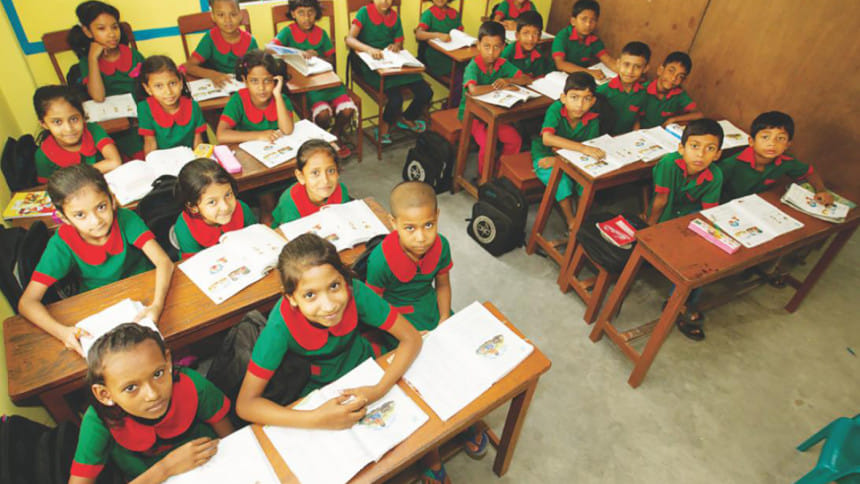Primary education: Quality of learning must be the same for all

Soon after the publication of my article on the art of teaching and learning at The Daily Star on June 28, a reader shared her thoughts with me. She worked with students in many government and NGO-run primary schools as part of a Teach for Bangladesh fellowship programme. Based on her experience of working at a particular primary school in Banshkhali, Chattogram, she wrote: "Most students [here] come from lower economic backgrounds and can't afford private tutoring. They can't pass their exams, don't understand anything in class and therefore lose their interest in education. I have witnessed numerous loopholes. Teachers are not adequately trained to adopt the modern teaching methods in classrooms. Most primary school teachers don't even bother about teaching and feel neglected too…" This situation at a school in Banshkhali Upazila is typical of many primary schools in rural Bangladesh. More than 28 years have passed since the parliament enacted the Compulsory Primary Education Act of 1990. There is now a separate ministry for primary and mass education, created in 1992. Multimedia and ICT-based learning was introduced in some 12,000 of the 63,041 government primary schools. Despite all these remarkable initiatives, why would there be such schools in Banskhali and other rural areas?
As of 2018, there are 63,041 government primary schools and an additional 1,959 NGO-run primary schools. The public schools are educating nearly 14.7 million students (51 percent girls) by employing 319,112 teachers (60 percent female). In other words, there is one teacher per 46 students in those schools. No wonder, the dropout rate from primary to secondary schools is nearly 49 percent. Introduction of ICT-based education has been expected to decrease the dropout rate. But that outcome will remain largely elusive until ICT-based learning is made accessible to all students.
A well-grounded primary education allows students to make a smooth transition to SSC and HSC levels, which in turn prepare them to make their way into institutions of higher learning. No one expects every citizen to get college/university education. The country needs at least a nominally educated workforce to produce food, work in factories and ports and so on. Therefore, primary education to acquire basic skills in reading, writing and arithmetic should be considered a basic right for all citizens.
In May 2015, former UN Secretary-General Ban Ki-moon stressed the importance of education when he observed, "The Republic of Korea is the only nation in the world that moved from the list of least developed countries to the Organization for Economic Co-operation and Development (OECD). There is one word that explains how: education. When I was a child in war-time Korea, we were constantly told to study hard. That was the only way to invest in our future—and it worked. Studies show that USD 1 invested in education can generate up to USD 15 in economic gain. If all students in low-income countries learned basic reading skills, more than 170 million people could be lifted out of poverty. Education is not a privilege; it is a birth right."
"A mind is a terrible thing to waste"—the realisation of this inescapable truth has prompted many nations, including Bangladesh, to put emphasis on primary education. But is enough being done? We can take a lesson from the No Child Left Behind (NCLB) Act passed by the US Congress for the advancement of Elementary and Secondary Education (ESE). The provisions of the Act began to take effect in 2003. NCLB's foremost focus is on skills in reading, writing, and mathematics. These areas are recognised as the most essential prerequisites for higher education and economic success. Since 2007, almost 71 percent of schools have cut down instruction time in subjects such as history, arts, language, and music, thus freeing more time and resources for mathematics and English.
Understandably, not all provisions of the NCLB Act are implementable or even applicable for ESE students in Bangladesh. However, there are some that can be adopted. Additionally, I would make the following recommendations for Bangladeshi schools: every school should have dedicated and effective teachers at all levels; they should make fair and accurate assessments of the students' strengths and weaknesses regularly; there should be a uniform standard for schools in urban and rural areas; ICT-based teaching should be implemented in all schools to avoid creating two classes of students with different levels of readiness for SSC and HSC exams.
Maintaining a uniform standard for schools in rural and urban areas is a moral imperative. The country has become wealthier by the year and is now on its way to become a middle-income nation. One wonders, what percentage of that thriving growth is expended to those who contribute the most to wealth creation by producing life-sustaining food stuffs for all citizens?
Dr Abdullah A Dewan, formerly a physicist and a nuclear engineer at BAEC, is professor of economics at Eastern Michigan University, USA. Email: [email protected]
Follow The Daily Star Opinion on Facebook for the latest opinions, commentaries and analyses by experts and professionals.
To contribute your article or letter to The Daily Star Opinion, see our guidelines for submission.

 For all latest news, follow The Daily Star's Google News channel.
For all latest news, follow The Daily Star's Google News channel. 



Comments